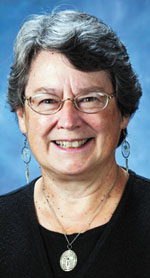By Corrine Winter
(Editor’s note: Since one commitment of The Catholic Messenger is promotion of Catholic intellectual life, Professor Corinne Winter of St. Ambrose University in Davenport is exploring themes and representative works that are part of the Catholic Intellectual Tradition. This is the second in a series of columns on the subject.)

In 1998, Pope Saint John Paul II wrote to the bishops of the Catholic Church an encyclical letter titled “Fides et Ratio” (English title: “On the Relationship between Faith and Reason”). In it, he described faith and reason as “two wings on which the human spirit rises to the contemplation of truth,” which is a God-given desire of all human persons (FR intro). In that letter and elsewhere, St. John Paul articulated one of the fundamental convictions of Catholic Intellectual Tradition: truth is one. Therefore, no true conclusion of any reasonable study can be opposed to the truth of the faith. Nor can two or more truths ultimately be opposed to one another.
That certainly does not mean that Catholic thinkers understand truth to be simple and directly understood or capable of being reduced to a finite number of propositions. Indeed, we understand truth to reside finally in God who is self-revealing and at the same time cannot be fully comprehended by the human intellect. This leads to two convictions.
The first of those convictions is that statements can be true or false and can be evaluated as to their truth value. That is true not only with regard to statements of empirical fact such as the sky is blue or that NaCl is the formula for salt. We can examine as well the truth or lack of truth in statements about our understanding of God or the rightness of certain courses of action. When we engage in such evaluations, we must respect the complexity of the question, the diversity of human experience and its effects on human worldviews, epistemology and language. We must presume the good will of those who enter into the conversation; ask the hard questions about language, context, and meaning; and be responsible to the community of humanity. Regarding questions pertaining to a particular discipline, we must be responsible to the community of scholars. Regarding questions about faith, we must be responsible to the community of faith.
The second conviction is that we ought not be quick to condemn someone’s efforts simply because his or her approach is new or different. Many Catholic scholars speak of the “analogical imagination” (David Tracy published a book with that title) as characteristic of Catholic thought. Rather than assuming that the truth of one statement immediately implies the falsity of all different statements on the same topic, Catholics tend to take a “both-and” approach, seeking to discern likeness, unity, and compatibility within diversity. Theologian Terrence Tilley, in his book “Inventing Catholic Tradition,” cites examples such as the use of pagan feast dates and even some practices for celebrations of the Christian faith, thus integrating rather than rejecting something that was important within a local culture before the arrival of Christianity. More importantly, Catholic tradition encourages dialogue to promote understanding rather than denunciation. Examples of dialogue leading to a renewed or deeper understanding out of apparent conflict include the ecumenical dialogues currently underway and statements such as the Lutheran-Catholic agreed statement on justification.
It must be acknowledged that writings of a number of theologians have recently been examined by members of the hierarchy. In each case, some have wondered to what extent members of the Magisterium are exercising censorship while others have insisted that they are primarily initiating dialogue. Mutual challenge and correction are important within a community dedicated to the search for truth, but it must be done with care. Pope Francis has called for a Church more dedicated to proclaiming what it offers than to denouncing certain ideas and action, even though certain prohibitions are clear and necessary.
Another expression of the conviction that truth is one is that Catholics reject a simple stern division between sacred and secular.
That rejection is evident, for instance, in works of the Catholic Social Justice Tradition. In documents as well as activities, the Church has claimed as its own proper concerns on issues such as the economy, just treatment of laborers, war and peace. Catholic leaders have sometimes been criticized for “meddling” in such things and have clung to the belief that Christians are called to care for all the needs of persons.
Further, Catholics find art, music and literature to be not only viable but necessary means of exploring truth. This holds whether or not the art is intended to be religious in nature. If it truly flows from the depths of the human spirit, it may put us in touch with the Spirit of God. At the same time, there are Catholic artists, poets, novelists and musicians who have engaged directly with Catholic themes. Father Ed Catich from St. Ambrose is a prominent example, as are St. Ambrose himself, Hildegard of Bingen (recently named a Doctor of the Church), author Flannery O’Connor and many others.
(Corinne Winter is a professor of theology at St. Ambrose University in Davenport.)








